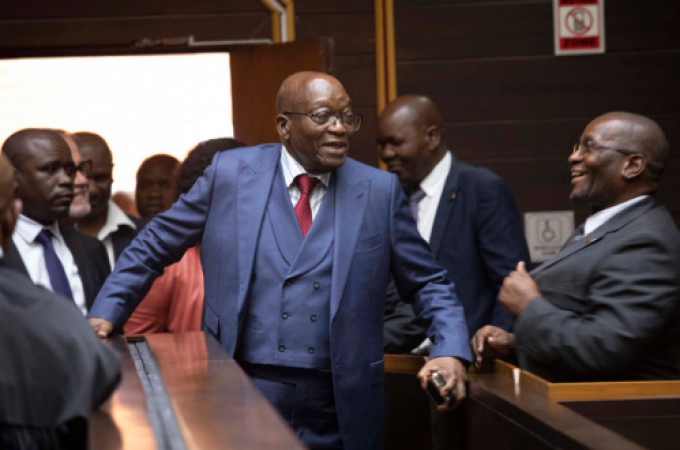
Johannesburg: Jacob Zuma, the former president of South Africa, was returned to prison on Friday after it was decided that his parole was invalid. However, he was released again two hours later as part of a new initiative to ease jail overcrowding.
The action prompted more inquiries about whether the 81-year-old is receiving special treatment to avoid serving out a 15-month sentence for contempt of court for refusing to testify at a corruption investigation. The main opposition party in South Africa referred to it as "an absolute joke".
President Cyril Ramaphosa gave the remissions programme his approval, and it was officially announced for the first time on Friday. Zuma appeared to be the first to benefit from it, despite the fact that justice officials claimed it aims to free more than 9,400 prisoners from custody and place them under correctional supervision at home.
Also Read: Serbian President: Western Battlefield Aid for Ukraine Doomed; Urges Moscow-Kiev Peace Talks
Zuma arrived at the Kwa-Zulu Natal province's Estcourt Correctional Centre at 6 a.m., purportedly to complete the final 13 months of his sentence. However, when his remission was processed, he was released after 7 a.m., according to Makgothi Thobakgale, the acting national commissioner of the corrections department.
In a convoy of black SUVs, Zuma later returned to his rural Nkandla estate, as seen on video released by South African media.
"Surprise, surprise, he is the first beneficiary of a brand new policy," declared John Steenhuisen, the Democratic Alliance's leader, the main opposition group in South Africa. "The justice system is being cynically manipulated in this case."
The Department of Corrections must now decide whether Zuma should return to jail to serve the remaining 13 months of his sentence or whether his time on medical parole should count as him having completed it. That medical parole was given to Zuma by a former prisons chief who was viewed as one of his political allies.
Also Read: Israel and United Arab Emirates Sign Defense Pact Amid Growing Tensions in Middle East
The corrections division chose neither option instead. Some people believed that including Zuma in the recently announced programme to reduce prison overcrowding was a ruse to prevent the kind of violent unrest that broke out in South Africa the first time Zuma was imprisoned.
In 2021, as rioting swept across Zuma's home province of Kwa-Zulu Natal and the economic centre province of Gauteng, more than 350 people lost their lives in some of the worst violence the nation had seen since the closing days of apartheid in the late 1980s and early 1990s.
When the Constitutional Court ruled that Zuma's early release on medical parole was improper, South Africa had sent the army to provide additional security in four provinces last month, and security forces were once again on high alert this week.
Zuma recently came back from receiving medical care in Russia for an undisclosed illness.
He is facing a 15-year prison sentence in a separate corruption trial where he is accused of corruption, fraud, racketeering, and money laundering. The trial, which revolves around a multibillion-dollar arms deal South Africa obtained before Zuma was president, has been slowed down by hearings and no testimony has yet been heard despite the charges being brought in early 2021.
After being cleared of rape in a 2006 trial, Zuma resurrected his political career and won the 2009 election for president of Africa's most advanced economy. He was called to testify at a judicial inquiry into the alleged corruption during his tenure after being forced to resign in 2018 due to corruption allegations.
Also Read: Yemeni military chief perishes in roadside explosion by Al-Qaeda
Witnesses at the inquiry testified about widespread corruption committed under Zuma's presidency, most often involving sizable contracts at state-owned enterprises. Zuma was found guilty of contempt of court because he refused to give a testimony.
Although the investigation revealed that under Zuma, South Africa lost billions of dollars in public funds to rampant corruption, no one has been found guilty of the graft, and no significant figures have been put on trial.